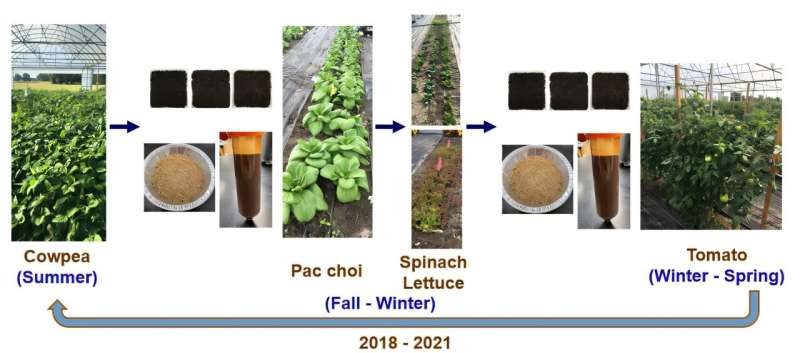
December 30, 2024 by Jane Cerza, American Society for Horticultural Science
Collected at: https://phys.org/news/2024-12-soil-nutrient-impact-leafy-greens.html
A recent study by scientists at the University of Florida sheds light on how soil and nutrient management practices significantly influence the productivity and quality of leafy green crops grown in high tunnel organic systems. The research provides valuable insights for organic farmers seeking to optimize crop yields while maintaining soil health and meeting market demands for high-quality produce.
Leafy greens, rich in essential vitamins and minerals, are increasingly in demand in the United States, with organic sales growing by over 24% between 2016 and 2021. Florida, a key producer of organic leafy greens, faces challenges in maintaining productivity due to subtropical conditions like temperature extremes, humidity fluctuations, and frequent rainfall. These challenges are compounded by sandy soils with low organic matter content, making water and nutrient management difficult. As high tunnel systems gain popularity among Florida growers, research is needed to evaluate their effectiveness in improving crop yields and quality under these conditions.
High tunnels, which are unheated greenhouse-like structures, are increasingly used in organic farming to extend growing seasons and protect crops from adverse weather conditions. Despite this growing interest in high tunnel organic vegetable production, limited information is available regarding optimizing nutrient management for organic leafy greens in Florida sandy soils.
In this 3-year study, the cowpea cover crop as well as a range of soil amendments, nutrient inputs, and management techniques were examined to determine their impact on crop performance in high tunnels, within the context of crop rotation as required by organic vegetable production. The work is published in the journal HortScience.
Results revealed that tailored and integrated nutrient management not only improved crop yields but also helped maintain the overall nutritional quality of organically-grown leafy greens, key factors for consumer satisfaction and marketability. It also pointed out the need to tackle the interactions of soil fertility management practices along with environmental conditions on vegetable mineral and phytochemical compositions while promoting crop productivity.
This study underscores the importance of balancing soil fertility and plant nutrient requirements, especially in high tunnel systems with sandy soils. Effective management strategies, the research suggests, can help mitigate challenges such as nutrient leaching and soil degradation, ensuring sustainable production for organic farmers.
These findings contribute to a growing body of knowledge aimed at supporting the organic agriculture sector, offering actionable recommendations for farmers and agricultural advisors. The high tunnel organic vegetable systems research was part of a recently completed multi-institutional project led by Dr. Xin Zhao.
Dr. Zhao is a Professor in the of Horticultural Sciences Department at the University of Florida, Gainesville. Her research program focuses on high tunnel vegetable systems, organic and integrated vegetable cropping systems and innovative technologies for improving crop resilience, soil health, and food quality in vegetable and strawberry production.
Lead author Shufang Tian completed her Ph.D. research in the Zhao Lab and now works as a Small Farms IPM Lead Academic Coordinator with the University of California Agriculture and Natural Resources.
Co-authors Drs. Jeffrey K. Brecht and Bala Rathinasabapathi are also professors in the Horticultural Sciences Department at the University of Florida.
More information: Shufang Tian et al, Influence of Soil and Nutrient Management Practices on Crop Productivity and Quality in High Tunnel Organic Leafy Green Production, HortScience (2023). DOI: 10.21273/HORTSCI17327-23
Journal information: HortScience

Leave a Reply